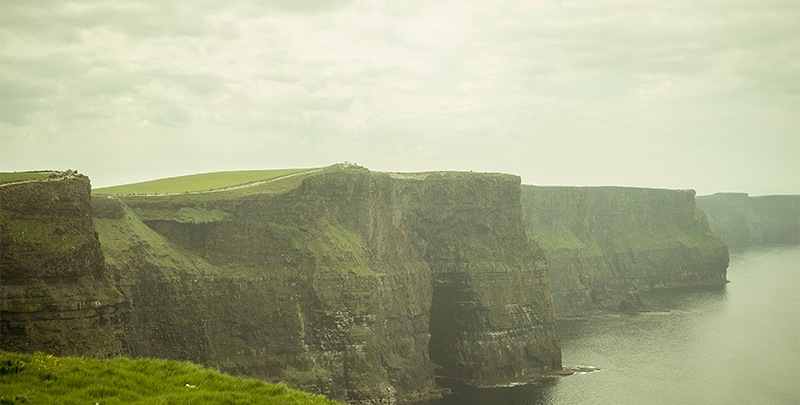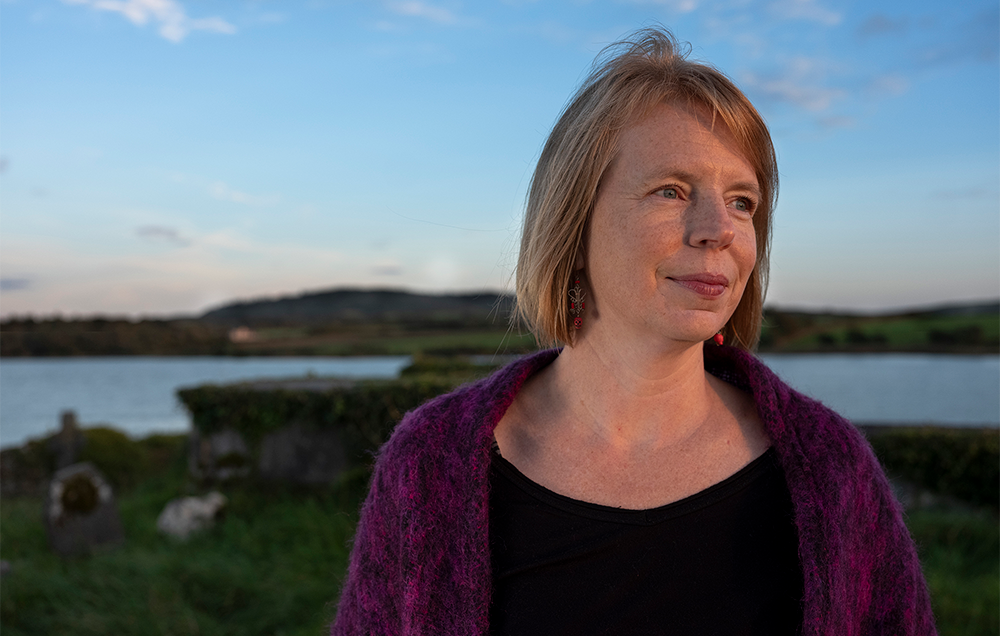Home > Emerging as a Doula in Rural Ireland
Emerging as a Doula in Rural Ireland
by Melissa Murphy
Is i bhfoscadh a chéile a mhaireann daoine.
It is in the shelter of each other that people live.
—Irish proverb

How timely to share these reflections near the anniversary of my relocation to Ireland (November will be seven years here!). It’s clear now that simultaneously moving to a new country while starting my end-of-life doula journey was (and continues to be!) pretty amazing. The luck of the Irish, perhaps? But also the encouragement of my husband, the blessing of time that this lifestyle change provided, and a whole lot of perseverance.
Is i bhfoscadh a chéile a mhaireann daoine.
It is in the shelter of each other that people live.
—Irish proverb
How timely to share these reflections near the anniversary of my relocation to Ireland (November will be seven years here!). It’s clear now that simultaneously moving to a new country while starting my end-of-life doula journey was (and continues to be!) pretty amazing. The luck of the Irish, perhaps? But also the encouragement of my husband, the blessing of time that this lifestyle change provided, and a whole lot of perseverance.

I began researching end-of-life/death doulas online in 2016 when there was little in the cyberspace ether. INELDA was the first resource I found, and its offerings and ethos resonated with me—along with the fact that the founder was once a social worker like me (I spent 15 years in various health care settings, including hospice). So I made a trip back to the States within the year for my first training, where I gained clarity and a sense of the foundation for this role that spoke powerfully to my heart. In the months that followed, while getting to know neighbours and community members around the village and nearby towns, I shared my passion for the path I was embarking on, pondering how I could serve as an end-of-life doula and my wish to get conversations about end of life flowing. The response was always, “That is so needed,” usually leading folks to share a story about a time when they could have benefitted from such support.
With shared enthusiasm from a well-loved local cafe, I facilitated a monthly Death Cafe for a year. To my astonishment, the first one drew a crowd of over 50 people—the next sign that my adoptive community was open to this. The years before and during the pandemic brought an abundance of connections, including locating other doula communities that were beginning to make themselves known. I completed additional courses linking with aspiring doulas in Ireland, then Mexico. I committed time to regular studying and introspection, eventually creating a simple website as a means to formally announce that I’d embodied the work I’d been dreaming of for years. Not long after, I supported neighbors who were the heart and soul of my learning—and unlearning—in terms of the social work role of my past.
Today I receive referrals by word of mouth, via my website, and courtesy a wonderful regional newspaper called West Cork People. When I wrote to the editor proposing a column written by an end-of-life doula, I was told it would be a valuable addition to the paper. I’m humbled today when someone tells me they read something I wrote, knowing this effort has brought me referrals as well. To date, I’ve written for 18 months about everything from what an end-of-life doula offers, to the benefits of talking about end of life and practical ways to do so, to stories of suicide loss and pet loss—both of which included my own experiences.
Speaking of the media, another surprise has been the warmth and openness of the Irish media. Over the years, I’ve been contacted by and spoken to local and national radio stations, several newspapers, a television show, and local filmmakers (have I missed anything?!). I was unprepared for the generosity and welcome to the work in this way, but suppose I need not have been surprised, as a slogan for Ireland is “land of a thousand welcomes.” To be honest, my intention was to quietly doula in my community, yet each speaking experience was a lesson affirming the importance of being a voice for this work. Education and awareness of this movement is everything for doulas and the public alike as our death and end-of-life culture is being transformed.
Today I support individuals with life-limiting illnesses, along with family and caregivers (the latter often exclusively). Some I meet in person, and others are and have only ever been virtual connections—some I may never even “see,” depending on their preference. I’ve accompanied a couple of individuals too, each for about a year, until we reached a point where our process felt complete as opposed to a “death having occurred.” I have been blessed to be part of dozens of stories from many more who have connected with me from about 2020 to present. I’ve been especially moved by the openness and courage of people reaching out to me early in their journey—giving us time to get to know one another, dialogue, and plan. This was a vision I had that was different than my experience as a former hospice social worker, where introductions were time sensitive and often it was not long before a patient died. I get to walk with the bereaved at their own pace too, whether it be months to a year or more after the loss.
I’ve always been comfortable with listening and talking about anything. People—often strangers—share pieces of their inner world with me. I’m not sure where the call to death work comes from, but it never made sense to me that the eventuality of our demise and the everyday grief of being human is talked about so little, if ever. Growing up in upstate New York, I loved walking in cemeteries for as long as I can remember (the older the better!). My mother, whose own father was born in Ireland, read the obituaries daily—and frequently aloud, when they included someone she knew. I’ve mentioned this to several people here in West Cork, and the response is always, “Ah, yes, that’s very Irish.”

Throughout my Ireland days, life and death have been teaching me as I’ve been planting roots and continuing to know my adoptive country. After all, being an end-of-life doula is a lifestyle too—doulas view our experiences through this lens. Here in the far southwest part of the country where the nearest city is 60 miles away, we have unique wakes. A few that really stand out to me, incidentally, have all been people who were “blow-ins” (people from other countries who, like me, now make Ireland our home). At the wakes I’ve attended, the deceased were either reposing in their own home or a funeral home, but each had an atmosphere that included music they loved, personal belongings in and around the casket—often including objects of humour—storytelling, and lots of food and beverage. Wakes can be a day or two or more, sometimes allocating one day just for immediate family. And funerals, quite another thing. Everyone is there.
During the pandemic people would line the streets just to make an appearance. As a friend of mine has explained it: In general you go, you turn up for the dead, and for those they leave behind. A funeral is definitely the excuse to miss anything else. In our village, often the funeral mass will be at the local church, and the coffin will be carried down the road directly to the graveyard with the community following beside and behind. It is quite a moving sight. Other times a request will have been made for a hearse to drive the deceased one last time past the home they were reared in, through an area of special significance, or past a favorite haunt they frequented.
In my early years, I did not attend a lot of funerals. What I do recall was straightforward: a funeral home that looked like the next, “calling hours” into rooms of whispers, handshakes, brief encounters, and quick departures. People, including the Irish themselves, will say the Irish do death well, and while this is true in some respects, a person I accompany now says her friends and neighbors will cook, tend her garden, and take her to town, but don’t want to hear about her illness or impending death. I’m also aware that when it comes to grief, it’s accepted when someone dies, but when ritual is over, you “get on with things.” That being said, many gather one month after a death and then annually to remember their dead. Much of the world knows of the rich culture and brilliance of Irish poets, musicians, writers, and so on. And living here there is so much more to be discovered. I’m often broken open; moved to deep, dark, aching places by film, theater, song lyrics, and books. But as another local friend shared, the irony is that “this is where everything goes, as we don’t openly speak about our pain—never mind death and loss—so all is channeled into the arts,” leading to a deep intensity. On a lighter note, our local robins with their plump orange bellies are believed to be auspicious, commonly seen as a sign of rebirth or connection from across the veil between the living and dead. It’s not uncommon for locals to speak about them or to delight in being visited by one in their garden. They also make appearances in local arts and crafts from springtime to the holiday season.
What I’m witnessing now and what’s taking shape over the years here is inspiring. Traditions such as honouring the Gaelic festival of Samhain (the origin of Halloween), which is about remembering the dead, have become more illuminated over the years. I’m hearing of country-wide ritual gatherings for ancestors this year more than ever. There are also more Death Cafes happening routinely all over this island, as well as grief and keening circles (keening was once an ancient tradition of women expressing sorrow while telling the story of the dead at a funeral) now being reimagined to collectively mourn things such as climate change and historical trauma. There are green graveyards from east to west and an interest in still more options to personalize our last chapter. I’m beginning to hear about end-of-life doulas and other deathcare workers in the country, and there are now excellent resources for grief literacy and education developing nationally. There are many ideas that myself and others in the community have for the future.
While I’ve had a serendipitous experience in Ireland, my journey hasn’t been entirely seamless. I imagine other doulas relate to those periods, particularly in the early days, including the inner challenges: overcoming fear of not feeling ready—that now-coined “imposter syndrome.” For me this was challenged by being a transplant from the States presenting something that was—and is—still quite new and different, demonstrating its value with all the beautiful customs that have long been here. Doing so in a rural place, all the while maintaining patience, ever listening and learning. Where I live people still stop everything to chat whenever paths are crossed. We linger over cups of tea, and I’ve come to trust the process.
